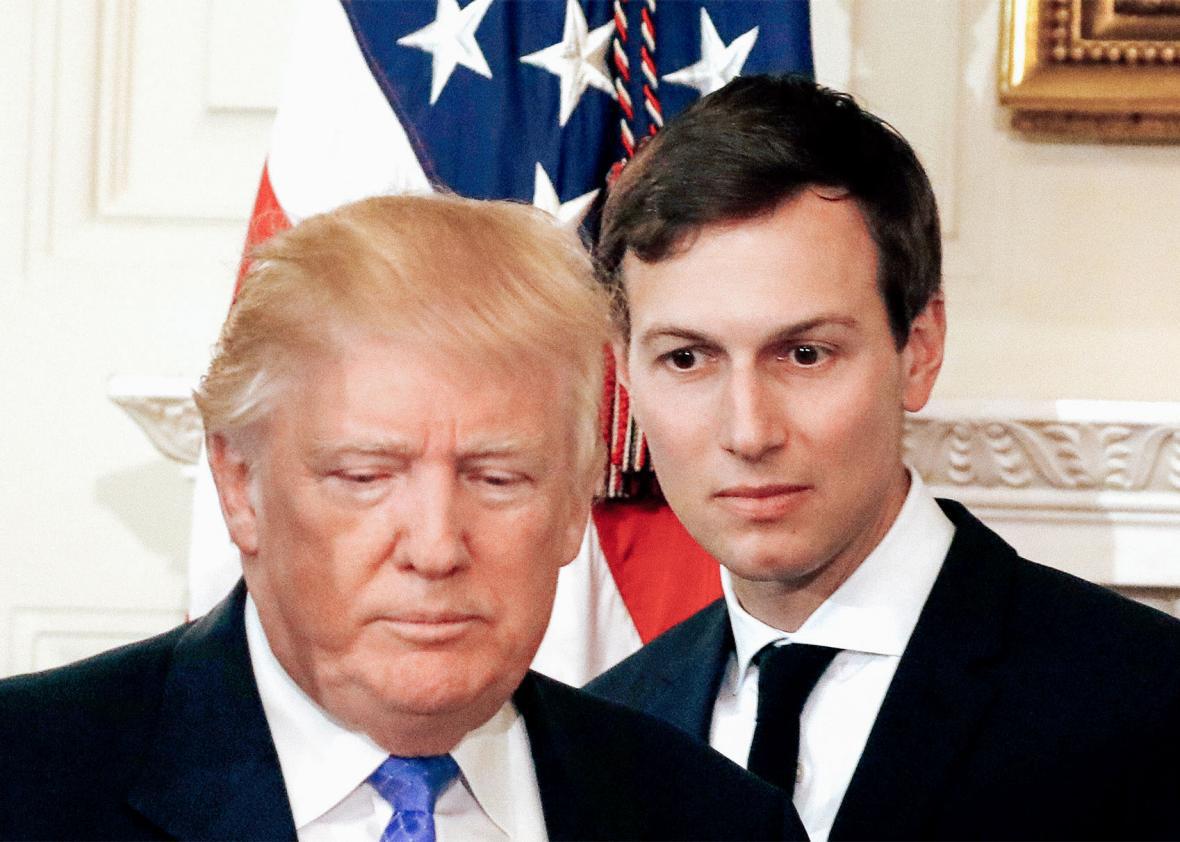President Trump is deeply unpopular. His foreign trip—his first such visit to America’s allies abroad—was marked by turbulence, ending in a spat with Germany. His legislative agenda has largely stalled, with little movement on either tax reform or his health care bill. His budget, released last week, was widely condemned and criticized, and he’s facing a potential battle over the debt ceiling.
Adding to the omnishambles is scandal. The investigation into the ties between Russia and his campaign has ensnared his son-in-law and adviser Jared Kushner, who allegedly proposed a secret communications channel with Moscow, located within the Russian embassy in Washington. In terms of Trump figures who are under the most serious scrutiny, Kushner seems to have surpassed former National Security Adviser Michael Flynn, who resigned his position over his ties to the Turkish and Russian governments and who is a subject of the FBI’s inquiry into the Trump campaign. None of this even touches the crises of Trump’s own making, like his firing of now former FBI Director James Comey after having allegedly instructed him to drop the investigation into Flynn—an overt effort to stop the Russia inquiry that appears very clearly to have been an attempt to obstruct justice.
Until and unless the special counsel investigation of Robert Mueller yields legally actionable fruit beyond press leaks, these problems are politically surmountable. That would, however, require focus, humility, and a willingness to change course. In this White House, those qualities are in short supply. Indeed, there’s no evidence—from either his life or political career—that Trump has the self-knowledge or discipline needed to turn his presidency around. Which is why, in the face of this storm, Trump’s solution is typically superficial—the president wants better PR. Rather than displace or remove the largely amateur advisers and confidants that have enabled his worst impulses, Trump will try, instead, to sell himself harder.
To that end, the president plans a media staff shake-up, which began on Tuesday with the resignation of his communications director, Michael Dubke, after just three months in the position. The Washington Post reports that Dubke, along with press secretary Sean Spicer, have been “under sharp criticism from Trump and many senior officials in the West Wing, who believe the president has been poorly served by his staff, in particular in the aftermath of the Comey firing.”
The thinking, then, is that a stronger communications staff—led, perhaps, by former campaign aides Corey Lewandowski and David Bossie—could better defend the president and advance his priorities in the face of criticism and scandal. If these crises were superficial—questions of appearance and rhetoric—that approach might work. But Trump’s problems are deep-seated and substantive. The president ultimately won’t be able to rebut Russia allegations with sharp tweets and an aggressive “war room,” not when he faces an independent FBI and general counsel investigation. A better sales job also won’t improve his legislative prospects, not when Americans have turned decisively against bills like the American Health Care Act. Just 8 percent of Americans want the Senate to pass the House version of the bill, 29 percent want the Senate to reject it outright, and 26 percent want major changes, according to the latest poll from the Kaiser Family Foundation.
Above all, a communications shake-up does little for Trump’s actual problem, his temperament. Trump is ignorant, erratic, and largely disinterested in the details of governance. His contempt for the truth, domineering instincts, and preoccupation with loyalty are authoritarian-minded and ill-suited to a fundamentally democratic office, whose power depends on cooperating with other parts of government as much as it rests on its formal authority as articulated in the Constitution. Even if Trump really were the businessman he claims to be—even if he had actual success in building things, rather than the image of success promoted through savvy branding and reality television—he would be in over his head at the White House.
As it stands, Trump is a man of few skills and worse instincts, whose political problems are largely of his own making and who lacks the self-knowledge to correct the course of his flagging administration. Nothing except a clean and competent administration might be able to change his popularity, which has flagged since the start of this administration. All the spice in the world can’t mask the taste of spoiled meat.
